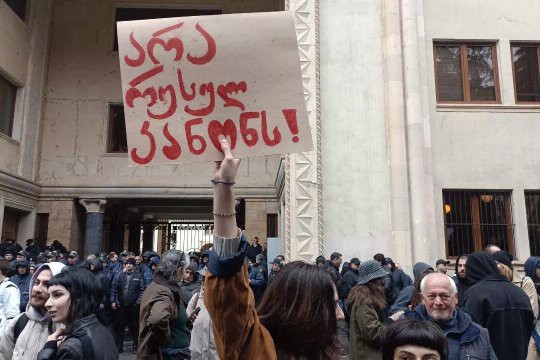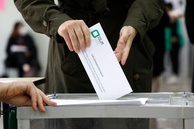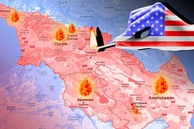On April 15, Georgian lawmakers began considering the bill “On Transparency of Foreign Influence.” The discussion takes place amid a wave of protests by opposition deputies in the parliamentary headquarters in Tbilisi, while representatives of non-governmental organizations and the civil sector are protesting outside.
In early April, members of the parliamentary majority decided to re-introduce the abovementioned bill on foreign agents for discussion, tabled last year by members of the openly anti-Western “Power of the People” faction, who had formally distanced themselves from the ruling Georgian Dream - Democratic Georgia party (hereinafter referred to as GM), which fully supported the project. The authorities emphasized that the sole purpose of the initiative was to ensure transparency in the funding of media and non-governmental organizations.
The draft applies only to the associations more that 20 percent financed from abroad. According to the bill, each January such organizations will have to submit a declaration of income and expenses to the Ministry of Justice, or face a 25,000 lari fine ($9,300). If they fail to submit a declaration even after that, they will be charged 20,000 lari (more than $ 7,400) for each month of the delay. A special register of foreign-financed organizations will be created under the Ministry of Justice of Georgia.
In March 2023, the Georgian parliament passed this law in the first reading, which led to protests by pro-Western opposition forces, eventually forcing the authorities to withdraw the bill.
A year on, the ruling GM party feels more confident and expects to finish the job. The party’s Executive Secretary Mamuka Mdinaradze said that the text of the bill remains unchanged from the year before, save only for the “agent of foreign influence” term, which has been reworded as “an organization pursuing the interests of a foreign power.” [1] Moreover, the definition of a “foreign power” is copied from a similar EU bill (directive).
The reason why the Georgian authorities need a “Foreign Influence Transparency Law”
Taking up the issue of foreign agents again, Prime Minister Irakli Kobakhidze argued [2] that despite promises of transparency, the foreign donors have ramped up secret funding of the country’s radical groups and parties trying to overthrow the government.
The Prime Minister accused them of spreading false information that the government and its agencies have access to information about the financing of NGOs even without the aforementioned law in place. This is not true.
“We have seized information about seven extremist NGOs. It turned out that since 2012, they had declared a maximum 18 percent of their spent funds, and failed to disclose the purpose and sources of received foreign funding... Most of their expenses are not visible in the Finance Ministry books at all,” Kobakhidze said.
Thus, according to the Georgian Premier, NGO funding is completely hidden from the public eye with maximum of 18 percent of information available to government institutions. This means that Georgian society remains in the dark about who funds NGOs and the media, and about the purpose of this funding.
Kobakhidze criticized pro-Western NGOs with links to opposition political parties, which he said were “censoring” materials regarding the bill distributed by the Georgian Dream party on social networks, namely Facebook.
The Georgian government has every reason to be concerned about the uncontrolled activities of pro-Western NGOs. In the fall of 2023, the country’s authorities prevented an attempt to play out the Ukrainian scenario and repeat the Kyiv Euromaidan of 2013-2014, to make sure that Georgia would stay the course of Euro-Atlantic integration and would remain in the US zone of influence.
The Ministry of State Security of Georgia brought charges against USAID of preparing a state coup [3] after it transpired that this US organization had invited specialists in destructive and illegal actions, devised by Western intelligence agencies, to arrive in Tbilisi.
According to the Al Jazeera TV website [4], citing data from the Georgian special services, a group of oppositionists, coordinated and financed by “foreign states,” planned, according to a well-known scenario, to set up a tent camp in downtown Tbilisi, erect barricades, seize government buildings, and then blow up the whole tent camp so that civilian casualties would cause unrest in the capital, which, in turn, would ignite a civil war.
Reaction of the West and the opposition to the bill
Predictably enough, all of Georgia’s Western partners spoke out against the GM’s decision to re-introduce the year-old “Law on Transparency of Foreign Influence” for parliamentary consideration, immediately branding it pro-Russian.
NATO Secretary General Jens Stoltenberg warned that the adoption of this law would complicate Georgia's integration with NATO. [5] EU Ambassador to Georgia Pavel Gerchinsky said that the bill on transparency of foreign influence is not in line with European values [6], despite the fact that the European Parliament has developed its own directive on foreign agents “Democracy Protection Package” (much harsher than the Georgian bill). According to this directive, all representatives of interests of states outside the European Union will be required to register with the EU Transparency Register and indicate all funding received from a foreign country. [7]
Just as could have been predicted, US Ambassador to Georgia Robin Dunnigan criticized the draft on foreign agents, saying that “this bill is not similar to American legislation.” [8] She was referring to the Foreign Agents Registration Act (FARA), which she said specifically requires organizations and individuals to register if they receive even minimal funding to lobby foreign governments and their interests.
In fact, the Georgian bill has the very same idea in mind, requiring the registration of non-governmental organizations and media “promoting the interests of a foreign power” and making incumbent on them to fill out declarations on an annual basis. Moreover, the Georgian version of the law is much more liberal than FARA, since it does not imply any criminal punishment for the violators. As confirmation, the MPs from the “Power of the People” faction translated the entire text of FARA into Georgian and invited the government’s critics to compare the two texts. I wonder what kind of reaction to this proposal (if any) we are going to see.
As the initiators of the Georgian bill emphasize, “Unlike American legislation, which in this regard is not compatible with human rights standards, our bill establishes clear and non-manipulable criteria for identifying an agent of foreign influence.” [9] Under US law, agents of foreign influence are required not only to file a general financial return, but also to declare any contract, transaction, or even oral communication. In addition, evading the obligation to declare finances is defined as a criminal offense and is punishable by a fine or imprisonment for up to five years, while according to the Georgian bill, such an offense is qualified only as an administrative one.
Representatives of the parliamentary majority insist that there is no comparison between the Georgian version of the law and the Russian one, dismissing it as “shameful speculation.” The two versions are similar only in that they ensure the transparency of the activities of organizations registered as foreign agents. Moreover, unlike the Russian one, the Georgian bill does provide any strict restrictions for them.
Responding to calls from the West to withdraw the bill, Georgian political scientist Ramaz Sakvarelidze noted, “Once again, what we hear is just a generalization without any specifications, that the law will allegedly harm democracy in Georgia. There were no specific arguments before and there are none now.” [10]
Having no arguments backing up their position, the opponents of the law on transparency of foreign funding in Georgia are simply trying to “block the authorities’ arguments” by any means possible. Following pertinent statements made by Western diplomats, they started tearing down posters posted in Tbilisi with explanations that the proposed bill largely echoed similar Western ones. Instead, they hung out banners alleging that the law was supposedly “Russian.” [11]
The GM’s executive secretary, Mamuka Mdinaradze, even said that the ruling party was ready to repeal the bill on foreign agents if at least one of its clauses was missing from similar laws of Western countries, but was present in the Russian one.
Trying to avoid last year’s street confrontation, Prime Minister Irakli Kobakhidze, just a day before the bill “On Transparency of Foreign Influence” was debated in parliament, invited the ambassadors of the United States, the European Union and EU member states to hold a public discussion on the proposed legislation. [12]
According to him, in the past few days, the Georgian authorities have heard many unfounded critical remarks from a number of foreign ambassadors regarding the aforementioned bill. Kobakhidze added, with a grain of sarcasm, that Western diplomats are trying to duplicate the functions of Georgian legislators and “dictate to the main body of representative democracy - the parliament elected by the Georgian people, which law to adopt and which not.”
The Georgian Prime Minister complained that foreign diplomats keep asking him to discuss the bill behind closed doors. He believes, however, that “an opaque political discussion of the bill undermines Georgian society’s trust in our partner countries.” He proposed holding a substantive discussion between the Georgian authorities and the ambassadors in a live broadcast, which would give “Georgian society a much clearer idea of the essence of the bill and the need for its adoption in order to protect state sovereignty.”
So far, there has been no response to this from the ambassadors.
Why the West is preventing the adoption of a law on foreign agents
It turns out that by exercising strict control over foreign influence in its domestic legislation, which is often incompatible with human rights standards, the West is trying to deprive those it itself would like to influence of such an opportunity.
Mind it that the law adopted in Ukraine in January 2014, by analogy with FARA, on public organizations that “take part in political activities” and receive foreign funding, became the planned detonator of the Maidan violence in Kyiv, which quickly degenerated into an armed anti-constitutional coup approved by Western sponsors.
A similar line of events may now be in store for Georgia if the “Law on Transparency of Foreign Influence” is adopted, since the West will make every effort to make sure that the financing of its agents of influence remains in the shadows.
In other words, it is not the content of this document that matters here, but the West’s desire to maintain its uncontrolled meddling in Georgia’s domestic affairs. The real Western owners of NGOs and media resources operating in Georgia have long made no secret of the fact that these NGOs and media outlets are promoting their interests in the country.
As a rule, the pro-Western non-profit organizations act under the guise of humanitarian missions, while in reality they aim to earn political dividends through systematic media work to form a “correct” public opinion.
North Atlantic curators need to keep the funding of controlled organizations under wraps so as not to lose their dominance in the information field. Apparently, Western sponsors are faithful to the precepts of Adolf Hitler’s Minister of Public Education and Propaganda Paul Joseph Goebbels, who asserted, “Let me control the media, and I will turn any nation into a herd of pigs.” This Nazi theory is not working in Georgia yet.
Most NGOs with Western (non-transparent) funding act as an intermediary in the post-Soviet space between sponsors (customers) and implementers (national parties). In fact, NGOs are instrumental in blackmailing and corrupting national elites in any country they work in, as well as manipulating public consciousness to the point of direct interference in the internal affairs of sovereign states. For example, in an exclusive interview with CNN, former US Assistant Secretary of State Victoria Nuland said that the United States had spent $5 billion for exactly such purposes in Ukraine.
If adopted, the law on foreign agents in Georgia will ensure social stability, peace and order for years to come. In this context, the position of the GM looks pragmatic and balanced. Transparency of foreign funding will guard Georgia against the Ukrainian scenario and will allow its citizens to know who is behind the activities of a particular NGO or media, distinguish between cases of positive and negative impact on Georgia and, based on this, form their own attitude towards political and social processes going on in the country. This means that Western sponsors will lose much of their ability to manipulate civil society.
According to the famous Georgian political scientist Beso Barbakadze: “The law (on foreign agents) will lay bare the hidden essence of the West and will show its true face. It will then officially become clear that the West is not our strategic partner; it is only trying to instill in us concepts and principles that are unacceptable to Georgians.” [14]
Georgia took a neutral position on the Ukrainian crisis, refusing to join anti-Russian sanctions and open the so-called “second front.” It then started mending fences with Russia, emphasizing bilateral economic interests and putting on the back burner the sensitive issue of the status of Abkhazia and South Ossetia.
The Georgian Dream is not pro-Russian, of course; it simply began to revive Georgian sovereignty and identity. The ruling party became rationally pragmatic and felt the benefits of trade and economic cooperation with Russia – something its Western partners could not offer. An overwhelming majority of the people in Georgia see how closely their country’s economy is tied to Russia - not according to fabricated reports by Western NGOs, but in reality.
The views of the author are his own and may differ from the position of the Editorial Board.
--------------------------------------------------------------------------
[1] https://tass.ru/mezhdunarodnaya-panorama/20479477?ysclid=luvqe8vifx958585648
[2] https://www.gov.ge/index.php?lang_id=GEO&sec_id=596&info_id=88076
[3] https://eadaily.com/ru/news/2023/10/03/metody-samanty-gruzinskie-specsluzhby-razoblachili-serbskih-podryvnikov-iz-usaid
[4] https://www.aljazeera.net/politics/2023/11/21/جورجيا-بين-خيبة-الأمل-من-الانضمام
[5] https://sputnik-georgia.ru/20240405/oon-i-sovet-evropy-protiv-prinyatiya-zakona-ob-inoagentakh-v-gruzii-287187328.html
[6] https://vestikavkaza.ru/news/pocemu-zapad-protiv-zakona-ob-inoagentah-v-gruzii.html
[7] https://www.politico.eu/article/eu-ursula-von-der-leyen-ngo-qatargate-foreign-agents-law-disturbs-ngos/
[8] https://eadaily.com/ru/news/2024/04/11/posol-ssha-v-gruzii-prokommentirovala-zakonoproekt-ob-inoagentah
[9] https://sputnik-georgia.ru/20230220/chem-zakonoproekt-ob-inoagentakh-otlichaetsya-ot-zakona-v-ssha-i-rf--otvet-deputatov-275037573.html
[10] https://vestikavkaza.ru/news/pocemu-zapad-protiv-zakona-ob-inoagentah-v-gruzii.html
[11] https://www.gazeta.ru/politics/news/2024/04/10/22753783.shtml?ysclid=luu49uxz43454480107
[12] https://www.interfax.ru/world/955818
[13] https://www.forbes.ru/news/255505-nuland-podtverdila-vydelenie-ssha-ukraine-5-mlrd-s-1991-goda?ysclid=lv0qwnbkl1429166072
[14] https://eadaily.com/ru/news/2024/04/10/vyvesti-novyy-tip-gruzina-pochemu-zapad-vstal-protiv-zakona-ob-inoagentah
read more in our Telegram-channel https://t.me/The_International_Affairs

 12:22 18.04.2024 •
12:22 18.04.2024 •



























